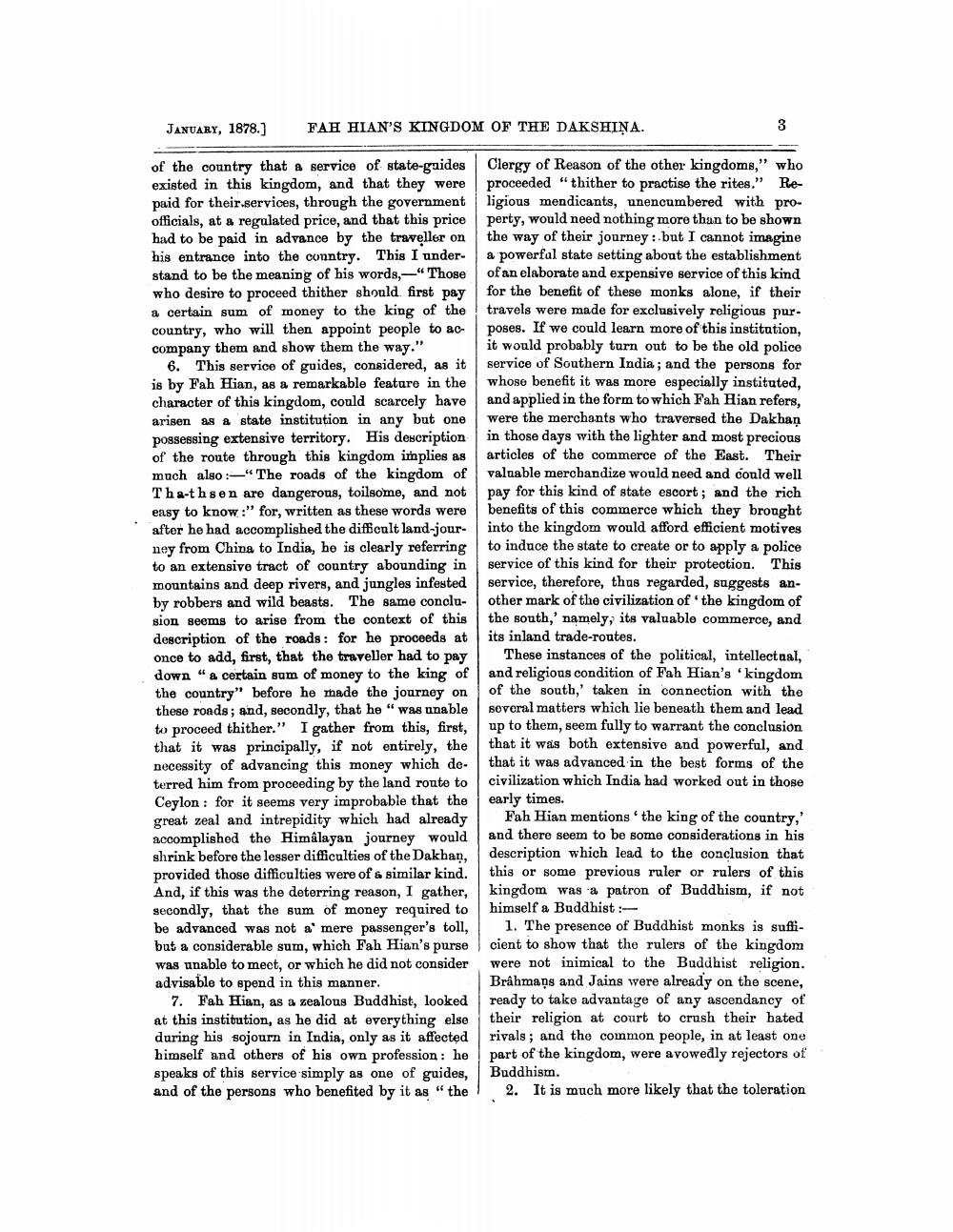Book Title: Indian Antiquary Vol 07 Author(s): Jas Burgess Publisher: Swati Publications View full book textPage 9
________________ JANUARY, 1878.] FAH HIAN'S KINGDOM OF THE DAKSHIŅA. of the country that a service of state-guides existed in this kingdom, and that they were paid for their.services, through the government officials, at & regulated price, and that this price had to be paid in advance by the traveller on his entrance into the ounntry. This I understand to be the meaning of his words,—“Those who desire to proceed thither should first pay a certain sum of money to the king of the country, who will then appoint people to accompany them and show them the way." 6. This service of guides, considered, as it is by Fah Hian, as a remarkable feature in the character of this kingdom, could scarcely have arisen as a state institution in any but one possessing extensive territory. His description of the route through this kingdom implies as much also :-“The roads of the kingdom of Tha-thsen are dangerous, toilgome, and not easy to know :" for, written as these words were after he had accomplished the difficult land-journey from China to India, he is clearly referring to an extensive tract of country abounding in mountains and deep rivers, and jungles infested by robbers and wild beasts. The same conclusion seems to arise from the context of this description of the roads: for he proceeds at once to add, first, that the traveller had to pay down " a certain sum of money to the king of the country" before he made the journey on these ronds; and, secondly, that he was unable to proceed thither." I gather from this, first, that it was principally, if not entirely, the necessity of advancing this money which de. terred him from proceeding by the land route to Ceylon : for it seems very improbable that the great zeal and intrepidity which had already accomplished the Himalayan journey would shrink before the lesser difficulties of the Dakhan, provided those difficulties were of a similar kind. And, if this was the deterring reason, I gather, secondly, that the sum of money required to be advanced was not a' mere passenger's toll, but a considerable sum, which Fah Hian's purse was unable to meet, or which he did not consider advisable to spend in this manner. 7. Fah Hian, as a zealous Buddhist, looked at this institution, as he did at everything else during his sojourn in India, only as it affected himself and others of his own profession: he speaks of this service simply as one of guides, and of the persons who benefited by it as "the Clergy of Reason of the other kingdoms," who proceeded "thither to practise the rites." Religious mendicants, unencumbered with pr perty, would need nothing more than to be shown the way of their journey: but I cannot imagine a powerful state setting about the establishment of an elaborate and expensive service of this kind for the benefit of these monks alone, if their travels were made for exclusively religious pur. poses. If we could learn more of this institution, it would probably turn out to be the old police service of Southern India, and the persons for whose benefit it was more especially instituted, and applied in the form to which Fah Hian refers, were the merchants who traversed the Dakhan in those days with the lighter and most precious articles of the commerce of the East. Their valuable merchandize would need and could well pay for this kind of state escort; and the rich benefits of this commerce which they brought into the kingdom would afford efficient motives to induce the state to create or to apply a police service of this kind for their protection. This service, therefore, thus regarded, suggests another mark of the civilization of the kingdom of the south,' namely, its valuable commerce, and its inland trade-routes. These instances of the political, intellectual, and religious condition of Fah Hian's 'kingdom of the south,' taken in connection with the soveral matters which lie beneath them and lead up to them, seem fully to warrant the conclusion that it was both extensive and powerful, and that it was advanced in the best forms of the civilization which India had worked out in those early times. Fah Hian mentions the king of the country,' and there seem to be some considerations in his description which lead to the conclusion that this or some previous ruler or rulers of this kingdom was a patron of Buddhism, if not himself a Buddhist : 1. The presence of Buddhist monks is sufficient to show that the rulers of the kingdom were not inimical to the Buddhist religion. Brahmaņs and Jains were already on the scene, ready to take advantage of any ascendancy of their religion at court to crush their bated rivals; and the common people, in at least one part of the kingdom, were avowedly rejectors of Buddhism. 2. It is much more likely that the tolerationPage Navigation
1 ... 7 8 9 10 11 12 13 14 15 16 17 18 19 20 21 22 23 24 25 26 27 28 29 30 31 32 33 34 35 36 37 38 39 40 41 42 43 44 45 46 47 48 49 50 51 52 53 54 55 56 57 58 59 60 61 62 63 64 65 66 67 68 69 70 71 72 73 74 75 76 77 78 79 80 81 82 83 84 85 86 87 88 89 90 91 92 ... 386
